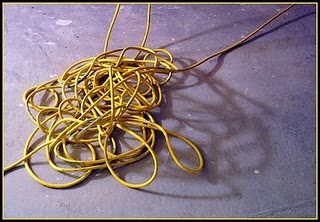
Image:http://farm3.static.flickr.com/2214/2217491693_bc01e272ea.jpg?v=0
Power Cord Safety
The U.S. Consumer Product Safety Commission (CPSC) estimates that each year, about 4,000 injuries associated with electric extension cords are treated in hospital emergency rooms.
Many of those injuries involve fractures, lacerations, contusions, or sprains from people tripping over extension cords. This article is about extension cord safety.
Thirteen percent of the injuries involve children under-five years of age; electrical burns to the mouth accounted for half the injuries to young children.
Extension Cord Safety Stats
The CPSC also estimates that about 3,300 residential fires originate in extension cords each year, killing 50 people and injuring about 270 others. The most frequent causes of such fires are short circuits, overloading, damage, and/or misuse of extension cords.
Extension cords aren’t all the same: basing your choice of extension cord on each task’s specific requirements, you can greatly reduce the risks of fire, electrical shock, and injury that come with improper use.
Before you plug in your cord:
• For your protection, power cord labels are printed with handy product specs that tell you the cord’s length, size (wire gauge), wattage, and proper usage environment (indoors or outdoors). So before you unwind that cord and hook it up to a power tool, read the label.
• When shopping for extension cords, only purchase those that bear the UL symbol. The presence of the UL mark tells you that samples of that particular type of cord have been tested by Underwriters Laboratories and received consumer safety approval.
• Don’t use damaged extension cords. Extension cords with cut insulation or exposed wires is a shock and fire hazard.
• Take precautions to avoid extension cord trip hazards on the job site. Tape the cords down at doorways or pathways and make sure to use a highly visible cord.
• Do not remove an extension cord’s grounding pin or plug blades to make it easier to plug into an outlet.
• Extended exposure to outdoor elements will cause cords to deteriorate, store all extension cords inside when not in use.
• To avoid potential safety hazards, always remember to unplug extension cords when they’re not in use.
If you enjoyed this post, make sure you subscribe to my RSS feed or receive updates via email

